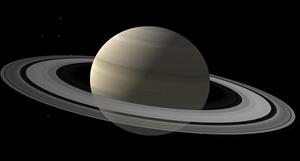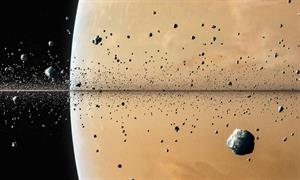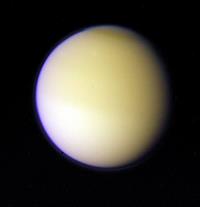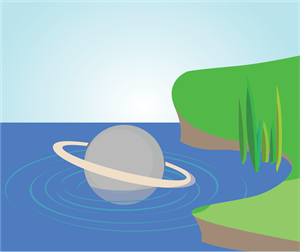PDF chapter test TRY NOW
The sixth planet, Saturn (Shani), is the second-largest gaseous giant after Jupiter. It appears yellow. The period of rotation is 10.66\ hours, and the period of revolution is 29.46\ years.

Saturn
Rings of Saturn:
Saturn is a unique planet with beautiful rings around it. Hence, it is also known as the 'Ring planet'. The seven rings of Saturn are made up of asteroids that are not visible to the naked eye. Hence, it can be observed with a small telescope.
Saturn is a unique planet with beautiful rings around it. Hence, it is also known as the 'Ring planet'. The seven rings of Saturn are made up of asteroids that are not visible to the naked eye. Hence, it can be observed with a small telescope.

Rings of Saturn
Satellites of Saturn:
Saturn is the only planet in the solar system with a large number of satellites or moons. It has more than 60 moons orbiting around it. This planet has around 82 moons, out of which only 53 moons were officially confirmed and named. Some of them are Titan, Enceladus, Mimas, Dione, and Tethys.
Saturn is the only planet in the solar system with a large number of satellites or moons. It has more than 60 moons orbiting around it. This planet has around 82 moons, out of which only 53 moons were officially confirmed and named. Some of them are Titan, Enceladus, Mimas, Dione, and Tethys.
Biggest Moon:
Titan is the largest natural satellite of this planet and comparatively larger than mercury. It is positioned as the second-largest natural satellite in the solar system, after Ganymede (Jupiter's moon).
Titan is the largest natural satellite of this planet and comparatively larger than mercury. It is positioned as the second-largest natural satellite in the solar system, after Ganymede (Jupiter's moon).

Titan
The density of the planet:
Saturn has the least density compared to the other planets in the solar system, with a density less than water. For example, if Saturn is kept on a pool of water, the planet can even float on the water.

Saturn floating on water
Reference:
https://live.staticflickr.com/348/32004738971_2060cef44c_b.jpg
https://upload.wikimedia.org/wikipedia/commons/4/4b/Titan_-_Nov_11_1980_%2822485272399%29.jpg
